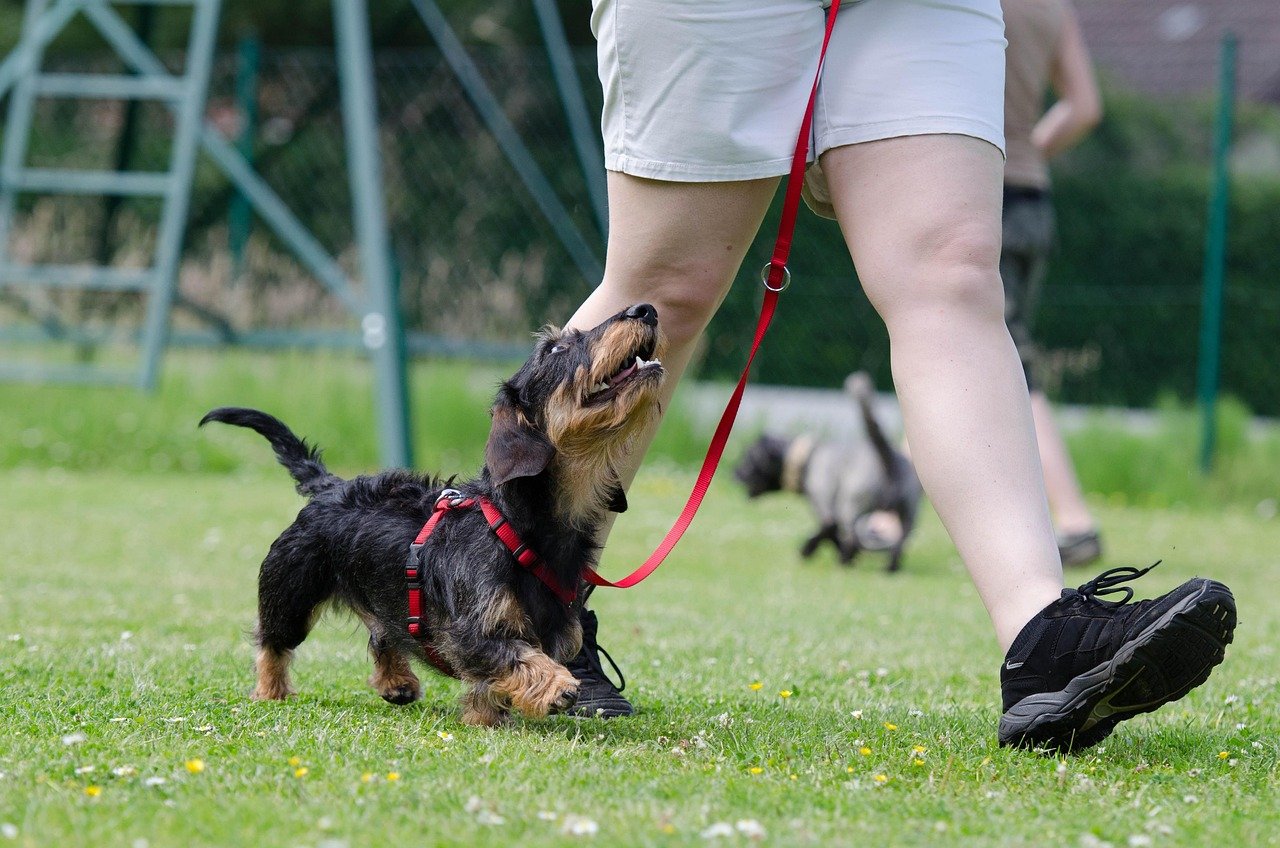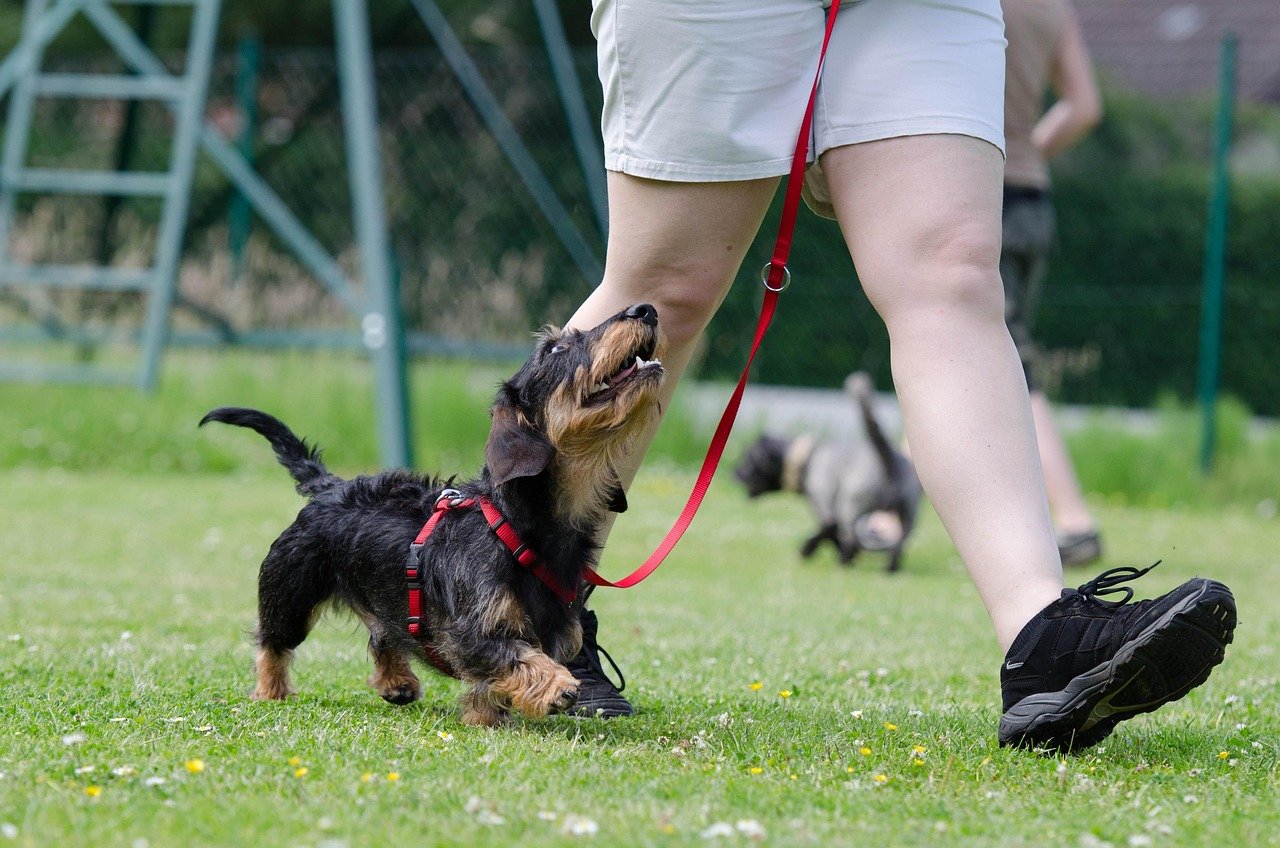Walking your dog isn’t just about burning off energy—it’s a cornerstone of their overall well-being. Regular walks help maintain a healthy weight, keep joints flexible, and reduce the risk of chronic conditions like obesity and diabetes. Mentally, walks are a goldmine of stimulation—new smells, sights, and sounds keep their brains engaged and curious. It’s also a powerful bonding time between you and your pup, building trust and strengthening your relationship. Plus, it helps curb behavioral issues by reducing boredom and anxiety. A daily walk is like a natural reset button for your dog’s body and mind. And let’s be honest—it’s pretty good for us humans too!
Supports Healthy Weight
Just like humans, dogs can easily pack on a few extra pounds if they aren’t moving enough. Carrying extra weight puts your dog at risk for all sorts of health problems, from aching joints to heart disease. A daily walk helps burn calories and keeps your pup fit and trim. It’s like their own version of a gym session, only way more fun. Even short walks add up—every trip around the block helps your dog avoid obesity and the health issues that come with it. You might notice your dog getting more agile and playful as the pounds drop off. Keeping your dog at a healthy weight can even add years to their life, making every step on those walks worth it.
Boosts Heart and Joint Health
A dog’s heart needs exercise just as much as yours does. Regular walking gets their blood pumping and keeps their cardiovascular system strong. It also keeps their muscles toned and their joints flexible, which is especially important for older dogs or breeds prone to arthritis. Think of it as oiling the hinges—movement keeps everything running smoothly. Without those daily walks, stiffness and pain can creep in, making it harder for your pup to move comfortably. For dogs recovering from injuries, gentle walking can speed up the healing process and rebuild strength. Every walk is an investment in a long, mobile, and happy life for your dog.
Improves Digestion and Urinary Health

Have you ever noticed that your dog seems eager to “do their business” as soon as you step outside? Walking helps regulate your dog’s digestive system and encourages healthy elimination habits. It’s like pressing the reset button on their internal clock. Regular outdoor breaks reduce the risk of constipation and bladder infections by giving your dog consistent opportunities to relieve themselves. This is especially crucial for dogs living in apartments or homes without easy yard access. Plus, fresh air and movement help keep everything moving on the inside, making for a happier, healthier pup.
Stimulates the Mind
A walk is a sensory adventure for your dog. Every sniff, sound, and sight along the way stimulates their brain, offering them a changing world of excitement. Dogs need mental exercise just as much as physical—they crave new smells, textures, and experiences. Without walks, boredom can set in, leading to destructive behaviors like chewing or barking. Exploring the neighborhood lets your dog use their incredible sense of smell, which is like reading a novel for them. Changing up your route or letting your dog lead the way sometimes can make walks even more mentally enriching. Think of each walk as a brain-boosting puzzle for your four-legged friend.
Reduces Stress and Anxiety

Dogs feel stress too, whether it’s from loud noises, changes in routine, or being left alone. Regular walks are natural stress-busters, releasing calming endorphins and helping your dog relax. The simple act of moving and exploring outside can turn a worried, restless dog into a calm and happy companion. If your dog suffers from separation anxiety, those daily walks can provide a sense of structure and predictability, which is deeply comforting. You might even notice that your own anxiety melts away during these moments together. A peaceful walk can be the best therapy for both of you after a long, stressful day.
Strengthens Your Bond
There’s something special about the quiet companionship of a walk. It’s just you and your dog, side by side, exploring the world together. These moments build trust and deepen your connection in ways that toys or treats never could. Dogs love spending time with their humans, and walking is quality time at its finest. You’ll notice your dog looking up at you, waiting for cues, and sharing in the joy of discovery. Over time, these walks become rituals—shared adventures that reinforce your unique bond. Many dog owners say they feel closest to their pets during these simple, everyday moments.
Encourages Socialization
A walk is your dog’s ticket to the world. Meeting other dogs, greeting neighbors, and experiencing new sights all help build your pup’s confidence. Social dogs are generally happier and less likely to react fearfully in new situations. Walks provide a safe environment for your dog to learn good manners around people and other animals. Even shy or nervous dogs benefit from gentle exposure to new faces and places. Over time, your dog may become less fearful and more excited about meeting others. Social walks can also be a great way for you to connect with fellow dog lovers in your community.
Decreases Destructive Behavior
Ever come home to find your favorite shoes chewed up or the trash can raided? Dogs with pent-up energy often turn to mischief. Regular walks tire your dog out in the best possible way, reducing boredom and the urge to act out at home. A tired dog is a happy dog, far less likely to dig, chew, or bark excessively. Walks give your dog a positive outlet for their energy, making them calmer and more content indoors. If you’ve struggled with unwanted behaviors, try adding an extra walk to your routine. You might be amazed at how quickly things improve!
Improves Training and Obedience

Walking is the perfect time to reinforce good behavior. Practicing commands like sit, stay, or heel out in the real world helps your dog learn to listen even when distractions are everywhere. Consistent walking routines teach your dog patience, self-control, and how to handle excitement. Many trainers call walks “moving classrooms” because they’re great for teaching leash manners and polite greetings. Dogs that walk regularly tend to be better behaved both on and off the leash. Plus, learning together builds your dog’s confidence and your own skills as a handler.
Promotes Healthy Sleeping Patterns

A well-exercised dog sleeps like a log. Physical activity during walks helps regulate your dog’s sleep cycle, making it easier for them to settle down at night. Dogs that get enough exercise are less likely to pace, whine, or wake you up in the middle of the night. Just like kids, dogs need to burn off energy in order to rest well. If your dog seems restless or has trouble sleeping, try making walks a consistent part of your day. You’ll likely notice deeper, more peaceful sleep for both you and your furry friend.
Provides Essential Exposure to the Outdoors

Dogs are natural explorers. The outdoors offers a world of stimulation—new smells, textures under their paws, and all sorts of wildlife to observe. Even city walks provide a change of scenery and a break from the monotony of indoor life. Fresh air and sunlight are just as important for dogs as they are for us. Sunlight helps regulate your dog’s mood and, in small doses, supports healthy vitamin D levels. Walks satisfy your dog’s natural curiosity and keep their senses sharp, making them healthier and happier overall.
Fosters a Happier, Longer Life

All these benefits add up to one amazing truth: walking your dog regularly can help them live a longer, happier life. The combination of physical exercise, mental engagement, social opportunities, and quality time with you creates a recipe for well-being that no supplement or toy can match. Dogs that walk daily are less likely to suffer from chronic illnesses and more likely to enjoy every stage of life, from puppyhood to their golden years. Walking is a simple habit with profound effects, and it’s one of the greatest gifts you can give your loyal companion.
At the end of the day, walking your dog is one of the simplest yet most impactful things you can do for their health and happiness. It keeps them physically fit, mentally sharp, and emotionally balanced. Plus, those daily strolls strengthen the bond you share. So grab that leash—your dog’s well-being (and tail wags) depend on it! What’s stopping you and your pup from heading out the door right now?

Born and bred in South Africa, a Capetonian at heart. Amy-Leigh’s love for nature and animals was inherited from her Dad. He loves taking the family on road trips to experience nature at its finest; Amy-Leigh’s favourite being whale watching in Hermanus and spotting Kudu along the West Coast. Amy-Leigh holds a BA in English Literature and Communication Studies.






